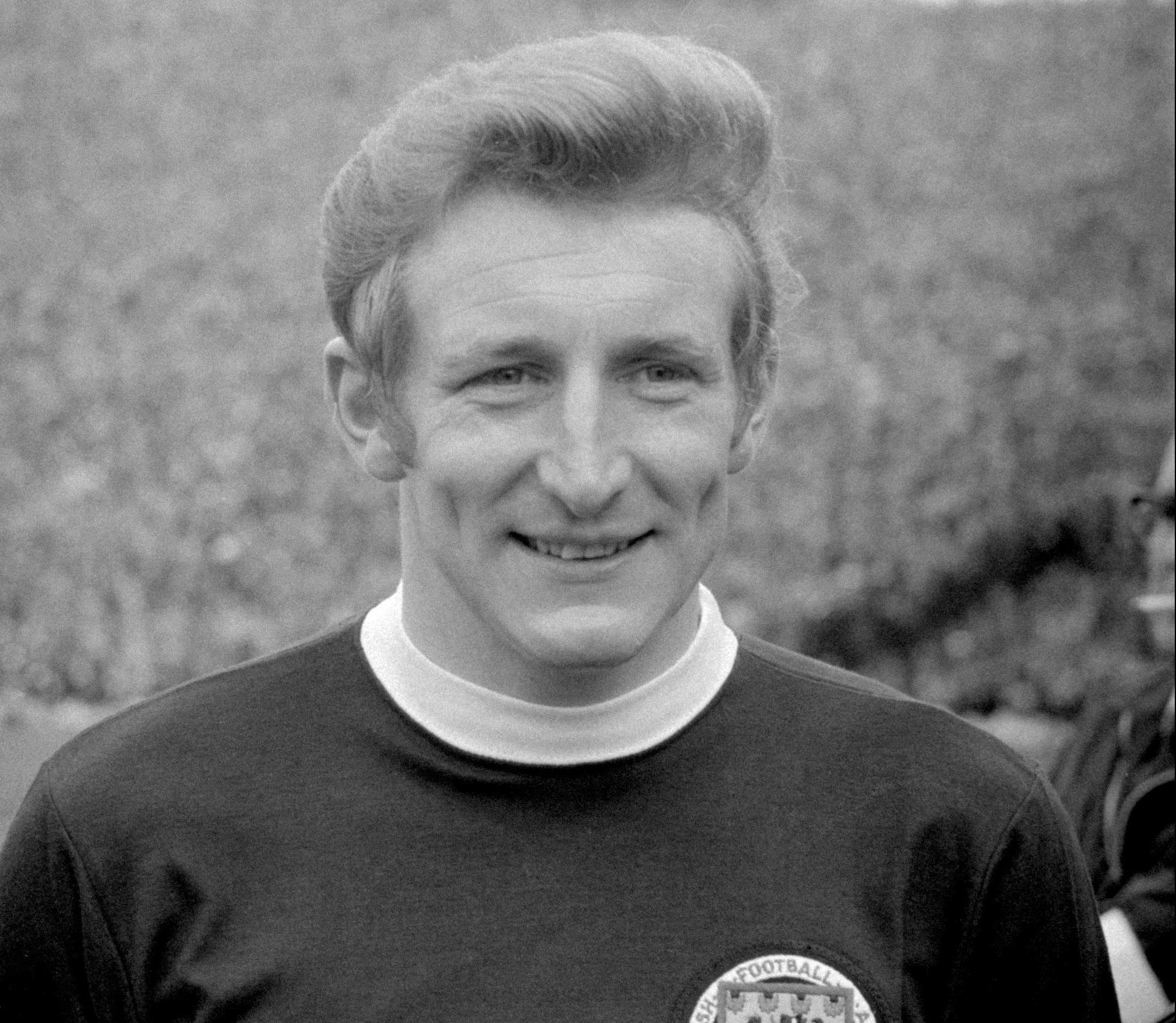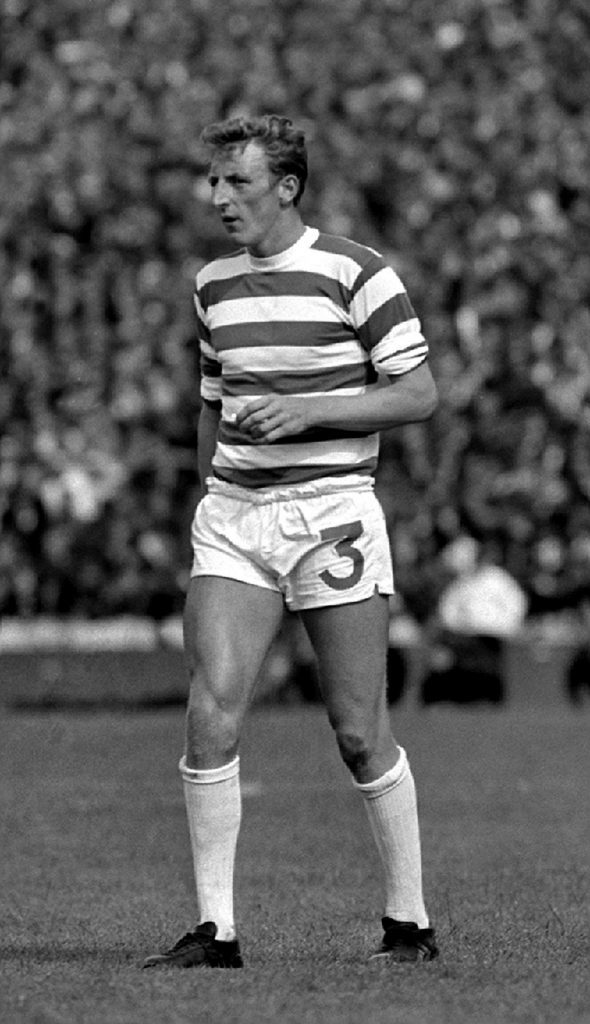
TOMMY GEMMELL, a member of Celtic’s ‘Lisbon Lions’ team which won the 1967 European Cup, has died at the age of 73 after a long illness.
Gemmell scored the equaliser in the final against Inter Milan in the Portuguese capital almost 50 years ago, with Stevie Chalmers netting the winner after another Gemmell raid down the left flank.
Celtic said in a statement on Thursday morning: “The whole Celtic Family is mourning his passing, and everyone associated with the club sends their thoughts and prayers to his family, his fellow Lions and his many friends at this desperately sad time.”
Gemmell also scored in the 1970 final when the Hoops were defeated by Dutch side Feyenoord.
Gemmell spent 10 years at Celtic between 1961 and 1971, making 418 appearances and scoring 63 goals.
He won six league titles, three Scottish Cups, four League Cups plus that European Cup triumph in 1967. Celtic’s victory made them the first British club to win the competition.
Celtic’s statement continued: “Tommy Gemmell is a true Celtic legend, part of the greatest side in the club’s history and a man who played a pivotal role in our greatest ever triumph when, in Lisbon’s Estadio Nacional, 11 men all born within a 30-mile radius of Celtic Park, beat Inter Milan to win the European Cup.
“The legend of the Lisbon Lions was created that night, and Tommy and his team-mates were assured their place in the pantheon of Celtic greats.
“And, like the rest of the Lions, Tommy remained humble about his incredible football achievements.”
Gemmell joined Nottingham Forest in 1971 and spent two years with the east midlands club.
He spent a short time in the United States with the Miami Toros before moving on to Dundee, who he led to victory over Celtic in the 1973 League Cup final.
He retired in 1977 and then managed Dundee for three years, before two spells in charge of Albion Rovers six years apart.
Celtic’s full tribute to Tommy Gemmell
“A member of the legendary Lisbon Lions, Tommy scored Celtic’s equaliser that famous day, on May 25, 1967, as Jock Stein’s side went on to beat Inter Milan 2-1 and lift the European Cup, the first British team to do so.
“And Tommy was also one of the few players to have scored in more than one European Cup final, scoring again three years later in the 1970 final against Feyenoord in Milan’s San Siro Stadium.
“He spent 10 years at Paradise, between 1961 and ’71, making 418 appearances and scoring 63 goals. And as well as his two European Cup final goals, there were also 31 penalties. Indeed, he only missed three spot-kicks from the 34 he took in his career, a remarkable conversion rate.
“Tommy’s first-team debut came on January 5, 1963 when he played in a 5-1 league win against Aberdeen at Pittodrie, while his first goal came at Rugby Park in October 1964. The Hoops lost 5-2 that day, although Celtic’s other scorer was the man who joined Tommy on the scoresheet in Lisbon just under three years later – Stevie Chalmers.
“Although renowned as a left-back, Tommy had actually started the historic 1966/67 season in the right-back role, but he switched flanks at the turn of the year, with Jim Craig coming in at right-back. And the two full-backs were outstanding in the European Cup final, with Jim Craig setting up Tommy to blast home Celtic’s equaliser.
“During his 10 years with the Hoops, Tommy won six league titles, three Scottish Cups, four League Cups and, of course, the European Cup. He was also capped 18 times for Scotland.
“He made his 418th and final appearance for Celtic on November 3, 1971 in a European Cup tie away to Sliema Wanderers. The Hoops had won the first leg 5-0, with Tommy scoring one of the goals, and they also won the return leg 2-1. Two months later, he joined Nottingham Forest where he spent two years, playing alongside future Celtic manager Martin O’Neill and coach John Robertson.
“After a short and unsuccessful spell at Miami Toros, he then joined Dundee for three years, and ironically captained them to League Cup glory, beating Celtic 1-0 in the 1973 final. He hung his boots up in 1977 and went straight into management at Dundee, staying there for three seasons. It was there he signed Jimmy Johnstone. He would then go on and manage Albion Rovers for two individual seasons, six years apart.
“Tommy Gemmell is a true Celtic legend, part of the greatest side in the club’s history and a man who played a pivotal role in our greatest ever triumph when, in Lisbon’s Estadio Nacional, 11 men all born within a 30-mile radius of Celtic Park, beat Inter Milan to win the European Cup.
“The legend of the Lisbon Lions was created that night, and Tommy and his team-mates were assured their place in the pantheon of Celtic greats.
“And, like the rest of the Lions, Tommy remained humble about his incredible football achievements.
“The whole Celtic Family is mourning his passing, and everyone associated with the club sends their thoughts and prayers to his family, his fellow Lions and his many friends at this desperately sad time.
“Our thoughts are with Mary and Tommy’s family and friends at this very difficult time.
“‘They never die who live in the hearts they leave behind.”‘

Enjoy the convenience of having The Sunday Post delivered as a digital ePaper straight to your smartphone, tablet or computer.
Subscribe for only £5.49 a month and enjoy all the benefits of the printed paper as a digital replica.
Subscribe